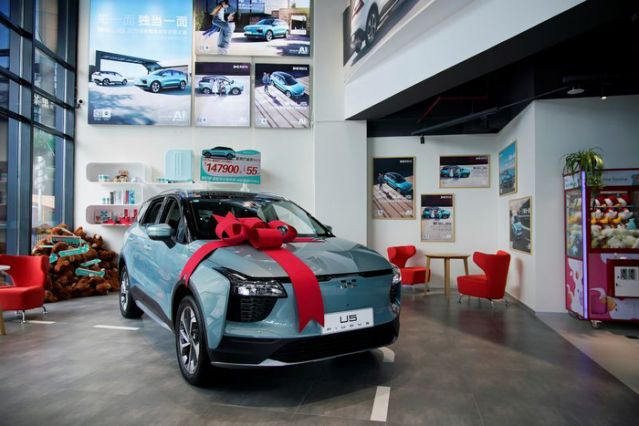
(Reuters) – China’s electric vehicle startups are on the charge again, thanks to Tesla.
The country’s growing fascination with the U.S. pioneer’s sleek designs and cutting-edge technology is giving a string of second-wave home-grown Tesla wannabes the traction to raise more funding, expand production and boost sales.
Chinese EV startups NIO, XPeng Inc, Li Auto and WM Motor have raised more than $8 billion between them this year and now rival Aiways is planning to go public, its co-founder and President Fu Qiang told Reuters.
Speaking ahead of the Beijing auto show which starts on Saturday, Fu said the relative success of U.S. initial public offerings (IPO) by XPeng and Li Auto had helped fuel the company’s ambitions to list.
Since it was founded in 2017 in Shanghai, Aiways has raised “no more than 10 billion yuan” and it will need to secure more funding from some private equity funds and other investors, said Fu, the former head of Volvo Cars China who has also been an executive at Mercedes-Benz, Skoda and FAW-Volkswagen.
“IPO is also in our plans, and we’re planning to push ahead with it,” Fu said, adding that Aiways would most likely be listed within China, declining to elaborate further.
China has been the world’s fastest-growing EV market for years helped by generous state purchase subsidies but the sales boom started to sputter last year as Beijing began cutting back financial support and watering down other pro-EV policies.
Some prominent Chinese EV startups such as Byton and Singulato have struggled and NIO’s future looked in doubt last year. But a surge in Tesla’s market value – and its sales in China – suggest the country’s EV dream is far from over.
“As Tesla stock goes, so goes the fate for electric vehicle startups,” said China auto expert Mike Dunne. “Funds are flowing like a river in spring again. Tesla could end up pulling everyone into the future sooner than expected.”
Tesla’s sales in China in the first eight months of 2020 have nearly tripled from a year ago to 73,658 cars, according to consulting firm LMC Automotive, despite the disruption caused by the COVID-19 pandemic.
Some Chinese auto executives say cars made by the company from Palo Alto, California are achieving the status of Apple’s first iPhones in China and with so many potential technological advances still to come, that gives them hope.
Fu believes the revived interest in EVs in China is partly because EV owners are fascinated by intelligent driving functions, as well as the interactive, so-called connected services that many newer models are starting to come with.
“Today’s smart, connected cars aren’t that smart. We’re just out of the gate and are in a stage that could be described as iPhone 1 or the original iPhone,” Aiways President Fu said. “As that gets developed step-by-step, in the near future we will get to iPhone 8, iPhone 9 and iPhone 10.”
Dunne, too, said Tesla was the primary factor sustaining interest in EVs among consumers and investors in China, and elsewhere in the world. Tesla’s shares have surged 10-fold over the past 12 months and it became the world’s most valuable car company in July.And cheaper running costs are also a significant factor.
Cui Yihua, who sells aquariums in the eastern city of Suzhou, Jiangsu province, switched from his gas-guzzling Audi Q7 to save cash and chose an electric-blue Aiways U5 sports-utility vehicle (SUV) after also test-driving a Tesla Model 3, saying he liked the U5’s interior design, its colour and extra space.
“I have charging facilities in my housing compound, in the parking garage downstairs. I put a 100-yuan deposit down for charging and I’ve been using it for two weeks,” he said. “It’s negligible compared to gasoline-fueled cars.”






